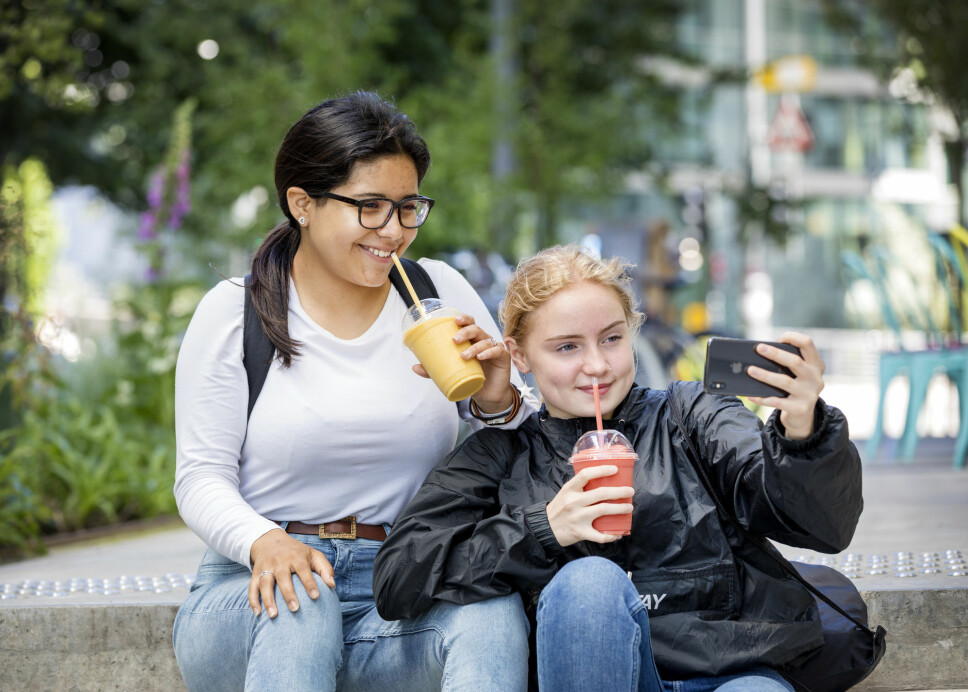
Why are teenagers drinking less alcohol than before?
Far fewer adolescents in big cities are drinking alcohol. Four out of ten 13- to 17-year-olds reported being drunk in 2002. In 2015 that percentage had declined by half. A big part of the reason is that they have become more home- and school-oriented and hang out less with friends.
Recent years have seen an increase in mental health problems among young people. Especially among teenage girls, depression and anxiety have become more prevalent.
At the same time, there is good news too. Adolescents are drinking far less alcohol now than before. They skip school less and fewer are involved in criminal activity. Antisocial behaviour is less common.
Researchers at the National Institute of Public Health (NIPH) wanted to find out why.
"Even though more teens report dissatisfaction, it’s equally interesting that they’ve become better behaved in recent years," NIPH researcher Leila Torgersen tells ScienceNorway.no.
Torgersen has just published an article in which she and colleagues Ingeborg Rossow and Hilde Pape looked to understand what can explain why young people today are drinking less.
City kids before and now
The researchers compared urban adolescents’ own reports from 2002 to 2015.
In 2002, four out of ten teenagers stated that they had gotten drunk in the past year.
Of the teens who were surveyed in 2013 and 2015, only one in five between the ages of 13 and 17 reported the same – a decline of 50 per cent compared to 2002.
The decline affected both boys and girls, and occurred across schools nationwide.
Kids driven to leisure activities
During the same period, adolescents have become more family- and school-oriented.
They spend more time at home alone or with the family.
They do activities with their parents more often than teens did around the turn of the millennium. Activities included leisure activities, various sports and games.
Professor Willy Pedersen at the University of Oslo, who did not participate in the study, thinks the findings are important and fascinating.
He believes the study does a good job illustrating that adolescents’ entire everyday life has been reorganized in the last 15 years.
"Today parents intervene and facilitate their kids’ leisure activities, and drive them to and from the activities," says Pedersen, who is a professor of sociology and has done a lot of research on youth and drug use.
"You can’t ask teenagers if they hang out on street corners a lot, because they hardly understand the question any longer," he says.
Rarely hang out with friends
The most significant change is that 13- to 17-year-olds nowadays hang out with their peers less often than they did 15 years ago.
That is, they’re out with friends less often without anything concrete to do.
The fact that they spend less time with friends on the streets in the evenings or in shopping malls, means fewer opportunities for hooliganism, which often leads to alcohol use.
Researchers have calculated that these changes can explain 23 per cent of the reason why adolescents are drinking less.
Criminal activities and unorganized free-time activities have also declined.
The teens answered questions about whether they had been involved in theft, vandalism, sneaking onto the bus or into the cinema, whether they had been in contact with the police due to criminal activity or whether they had fought with weapons like knives.
The researchers found a link between criminal activity and getting drunk.
Less truancy and more homework
Young people spend more time on homework than they did 15 years ago. This finding also applies to teens who were drunk in the last 12 months.
Truancy has become less common in the same period. Students are also less likely to have conflicts with their teachers.
More time on homework, less truancy and fewer conflicts with teachers explain almost as much of the decline in alcohol consumption as being out on the streets less.
The researchers found that all these changes in lifestyle together accounted for 43 per cent of the explanation for reduced alcohol use among adolescents.
More structured and methodical
Torgersen is one of the researchers behind the study. She believes that teens’ significant decline in alcohol use is largely due to the fact that they are much better behaved and methodical now than before.
"Adolescents are much more concerned with getting better grades than previously. Already in lower secondary school, they’re focused on getting into the most prestigious upper secondary schools," she says.
They’re thinking about where they want to spend their teen years and with whom. They want to go to the same schools as their friends. In high school, they have to work to get into their desired studies.
"There’s a lot more competition for the most popular study programmes at university now than there used to be," Torgersen says.
Generally healthy ideals
Torgersen believes the increased focus on school work is also connected with being slim and fit.
"The ideal now is moderation. Even those who drink alcohol, tend to drink less when they do. It's not cool to lose control," says Torgersen.
The high expectations may however also be associated with increased anxiety and depression, especially among young girls.
This new trend of teenagers behaving more proplery is also observed by resarchers in other countries.
«We see the same pattern in the USA, Canada and the EU,» she says.
Parents' drinking has little effect
The researchers also examined whether adolescents were present when their parents drink alcohol less than before, to see if this might be having an effect.
Parents’ drinking does not seem to have contributed to teens drinking less, the researchers believe.
They also investigated whether adolescents’ reduced alcohol intake could be due to other drugs replacing alcohol, but that did not seem to be the case either.

Social media may factor in
Young people with immigrant parents and backgrounds might also contribute to the statistics showing less use of alcohol, suggests sociologist Willy Pedersen.
In the past 15 years, digital media has taken over a lot of socializing with friends among adolescents.
"Gaming is a safe way to meet others, and the excitement of gaming may replace some of the excitement of alcohol use," Pedersen says.
But he warns that other social media can lead to increased drug use, such as apps where you can summon hordes to private parties.
«It would be exciting to see studies that reveal in more detail how social media affects young people's drug use,» Pedersen says.
Social media use not measured
Although researchers could identify over 40 per cent of the explanation for reduced alcohol consumption, they are unsure what the other reasons may be.
"We were limited to using the same questions that were used in 2002, and so we didn’t ask about social media use," says Torgersen.
But it does make you wonder if less physical contact with friends could be a contributing factor.
"The use of social media doesn’t in itself lead to less alcohol use. But alcohol is usually present in social settings. Therefore, it’s conceivable that teens drink less when more social gatherings have moved to digital platforms," says Torgersen.
Translated by: Ingrid P. Nuse
Reference:
Ingeborg Rossow et al: Decline in adolescent drinking: Some possible explanations. Drug and Alcohol Review, 2020. https://doi.org/10.1111/dar.13132
———

































